|
 One of the great legendary residents of the Santa Clarita Valley was inducted into the Country Music Hall of Fame on October 9, 1989.
One of the great legendary residents of the Santa Clarita Valley was inducted into the Country Music Hall of Fame on October 9, 1989.
Cliffie Stone and the Palomino Club.
Cliffie Stone became familiar to me long before I moved to the Santa Clarita Valley in 1991. In fact, I knew him as the Master of Ceremonies of the Thursday night talent shows at the Palomino Club in North Hollywood in the 1980s.
Los Angeles is not known as a Country music town today. But the roots of this musical genre's popularity in Southern California began with the migrants from the Oklahoma dust bowl in the 1930s and continued as many more people arrived in California from places like Texas, Oklahoma, Arkansas, Missouri and the Deep South states to seek jobs in wartime factories such as Lockheed and Hughes Aircraft during World War II.
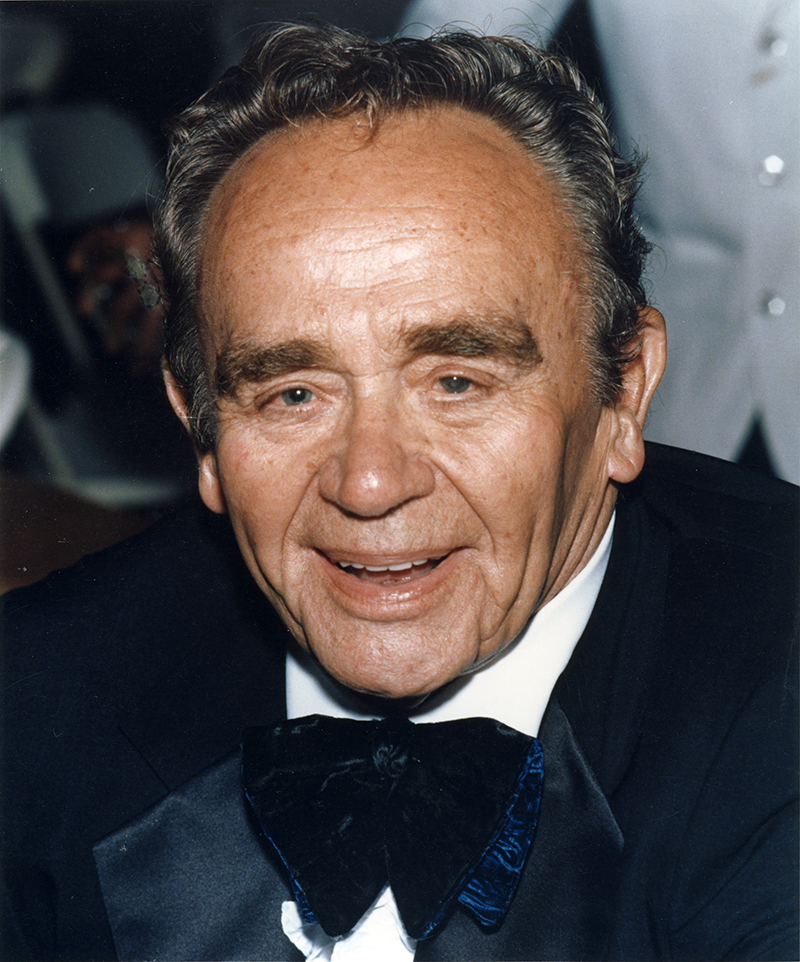
Click for more.
|
It was in this setting that Country music singer Hank Penny noticed a broken-down club called The Mulekick while driving down Lankershim Boulevard in the summer of 1949. Penny envisioned this rotting structure as a future mecca for Country music singers in the San Fernando Valley. He purchased the building, and after a short period of renovations, the Palomino Club was born.
Penny's vision indeed came to be, as the Palomino became one of the premier Country music clubs in America, drawing talent such as Linda Ronstadt, Emmylou Harris, Bob Wills and Merle Haggard. But none was more beloved than their emcee, Cliffie Stone.
When asked about the Palomino, Stone stated in a 1980 interview: "You had a natural audience for the music settling here, and the roots were ready to be tapped by people who could manage good clubs and Country performing halls. The Palomino is a classic example of that."
Yet, the story of Cliffie Stone goes far beyond his activities at the famed Palomino. Clifford Gilpin Snyder was born in Stockton, California, on March 1, 1917. After his family moved to Burbank in 1926, "Cliffie" became involved in the Los Angeles music and radio scene, playing bass for the big bands of Freddie Slacks and Anson Weeks and appearing on numerous radio stations such as KFI, KFWB and KFOX. He married his first wife, singer Dorothy Darling, in 1939 and had four children. They eventually became longtime residents of The Rolling Stone Ranch in Sand Canyon in the Santa Clarita Valley. Cliffie would go on to have a decorated 60-year career as television and radio producer, talent manager, publisher, author, singer and songwriter.
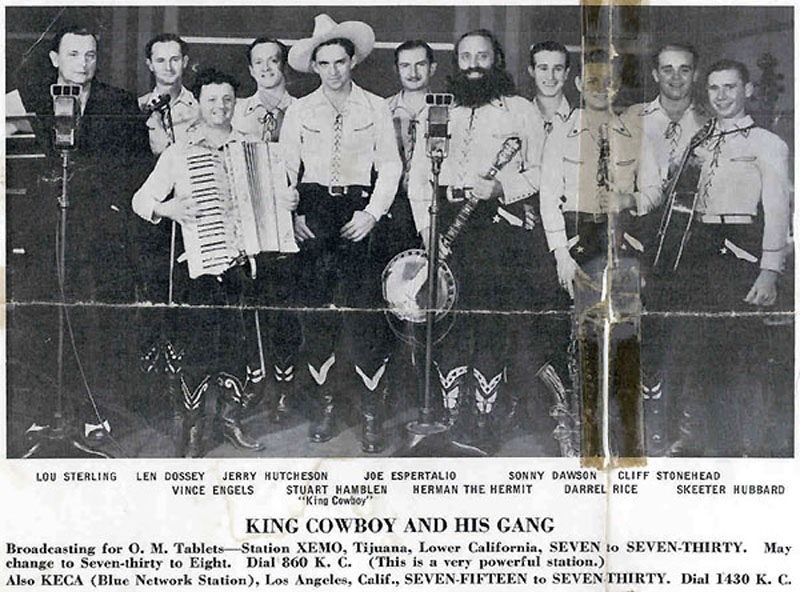
Performing with Stuart Hamblen and Herman the Hermit (Cliffie's father) in the 1930s. Click for more.
|
Eighteen-year-old Cliffie joined pioneer Country radio personality Stuart Hamblen's show, "Covered Wagon Jubilee," on KFVD in 1935 as a bassist and comic billed as Cliffie Stonehead. He worked with his father, long-hair and bearded musician Clifford Herman Snyder, aka Herman the Hermit, on the show. Cliffie eventually became the host of the show and later stated, "I lost my 'head' and became Stone."
While playing in Hamblen's band, Cliffie took classical music lessons. He later played in the Glendale Symphony Orchestra and then branched out into various swing and pop bands. After stints at the Pasadena Community Playhouse and Ken Murray's Hollywood Blackouts, Stone became more involved with radio, working as a deejay, emcee and performer on shows such as "Lucky Stars" on KFWB. He also formed a band and had an 18-year stint as a comedian on the CBS radio show, "Hollywood Barn Dance." In 1942, Stone started his first record label, Lariat Records, where he recorded Merle Travis, Wesley Tuttle and Les Paul's future partner Mary Ford, one of the Oklahoma Sweethearts.
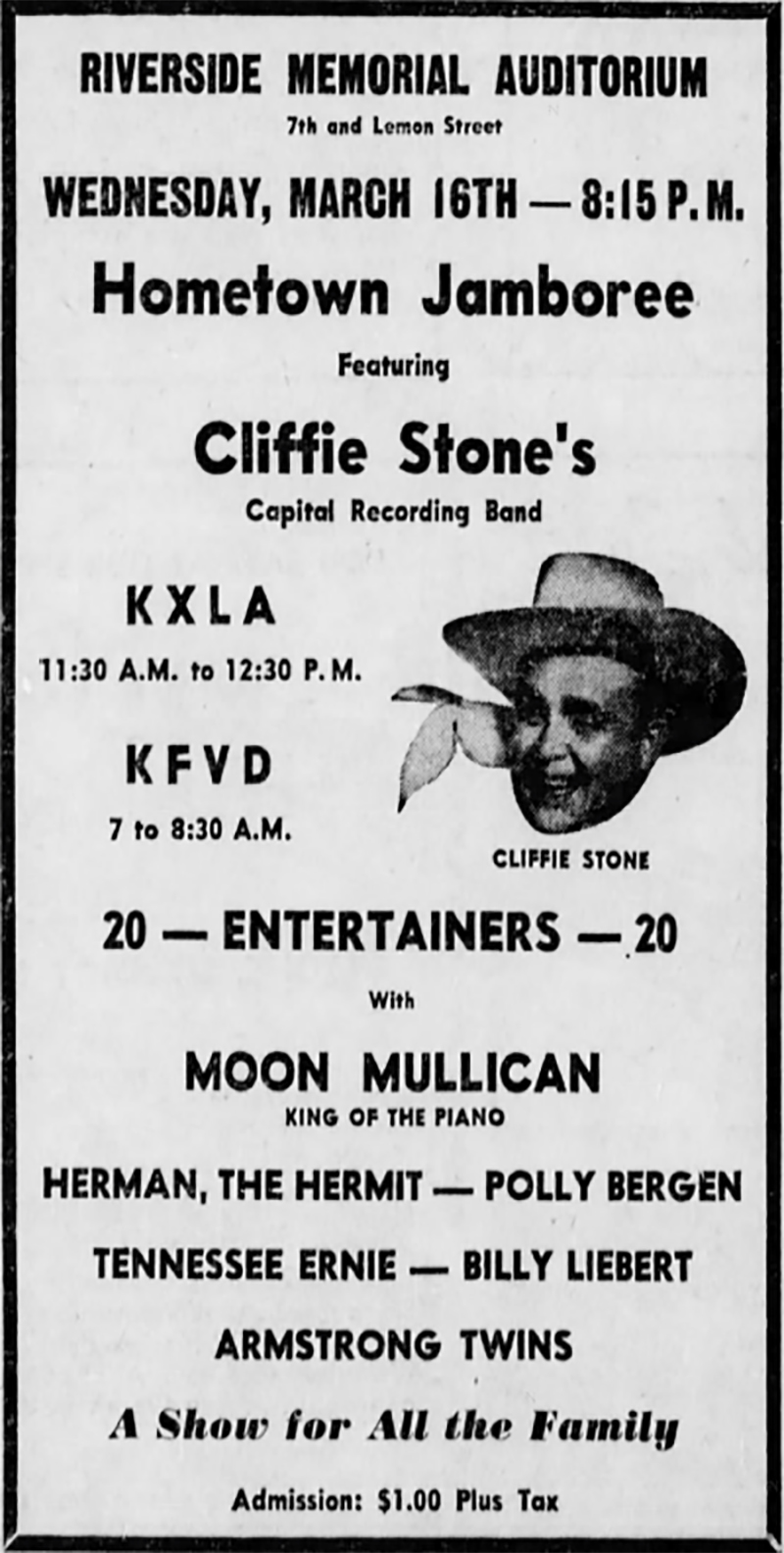
1949 advertisement. Click to enlarge.
|
Probably his greatest contribution in promoting the Country music scene in Los Angeles started in 1944 with a live music and comedy show called "Dinner Bell Roundup," broadcast from the Huntington Hotel on Pasadena's KPAS (later KXLA). In 1948, he started what would become his most famous show, "Hometown Jamboree," a name which is still remembered and honored to this day in Santa Clarita.
The show started as a Saturday night stage show at the American Legion Stadium in El Monte. As the country transitioned from radio to television, "Hometown Jamboree" was introduced on KLAC-TV/KCOP-TV in 1949 and later became a staple on KTLA Channel 5 from 1953-1959. Regulars on the show included Tennessee Ernie Ford, Eddie Kirk, Johnny Horton, Molly Bee, Ferlin Husky, and Cliffie's father, Herman the Hermit.
Stone would later reflect on the unpopularity of Country music in Los Angeles in the 1950s: "For a long time, it was almost like racial discrimination when you said you were Country. It used to be, if you were listening to Country music on your radio at a boulevard stop, you'd turn your radio down so nobody would know you were listening to it. It was looked down on by the musicians' union, everybody. We were like second-class citizens, which is OK because we did nothing but make money."
After selling Lariat Records, Stone joined the Bel-Tone label to produce records for Frankie Lane, Dale Evans and Eddie Dean. In 1945, Capitol Records took Stone away from Bel-Tone to play bass on records by artists such as Tex Ritter, Johnny Mercer and Riders of the Purple Sage. Label boss Mercer then hired him as assistant to Country A&R (artists and repertoire, i.e., talent scouting and development) executive Lee Gillette. There, he helped sign Merle Travis, Tex Williams, Tennessee Ernie Ford, Hank Thompson, Buck Owens, Merle Haggard, Stan Freberg, Tommy Sands, Ferlin Husky and Dallas Frazier to Capitol.
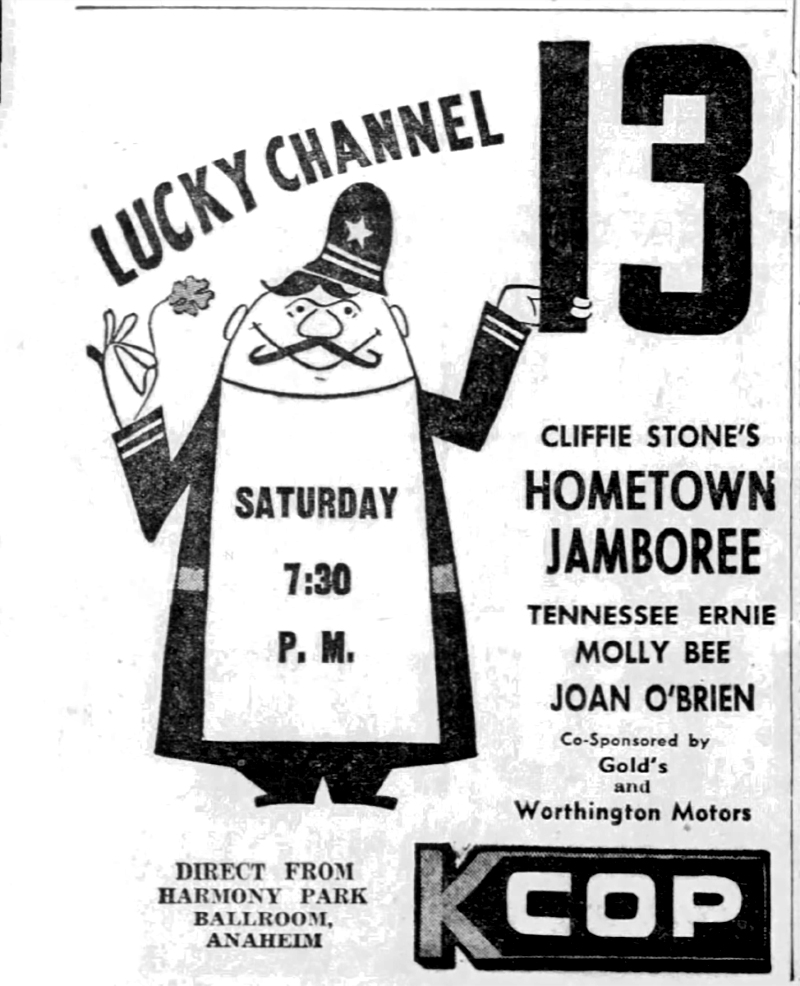
1954 advertisement. Click to enlarge.
|
Stone became more famous within the Country music community when he co-wrote three songs which reached the top-5 on the Country and Western music charts in 1946. They were "No Vacancy" with Merle Travis, "New Steel Guitar Rag" with Bill Boyd and the Cowboy Ramblers, and "Divorce Me C.O.D.," versions of which were recorded by Travis, the King Sisters and Johnny Bond. Other hits he co-wrote included "Shotgun Boogie," "So Round, So Firm, So Fully Packed," and "Anticipation Blues."
Perhaps his most important contribution to Country music was in the promotion of other Country artists who became famous in their own rite. The biggest of these was Tennessee Ernie Ford.
While working as host of "Dinner Bell Round-Up," Stone's first introduction to Ford was hearing him as a morning disc jockey while driving to Palm Springs for a meeting. He saw something in Ford's delivery and convinced him to join his show as a comic and vocalist in 1947. After Ford recorded a hit Country tune in 1950 with Kay Starr ("I'll Never Be Free") and was asked to perform in Las Vegas, he hired Stone as his manager, even though Stone had never done that job before.
When Stone informed him of his lack of managerial experience, Ford replied: "Well, we're even. I've never had one before."
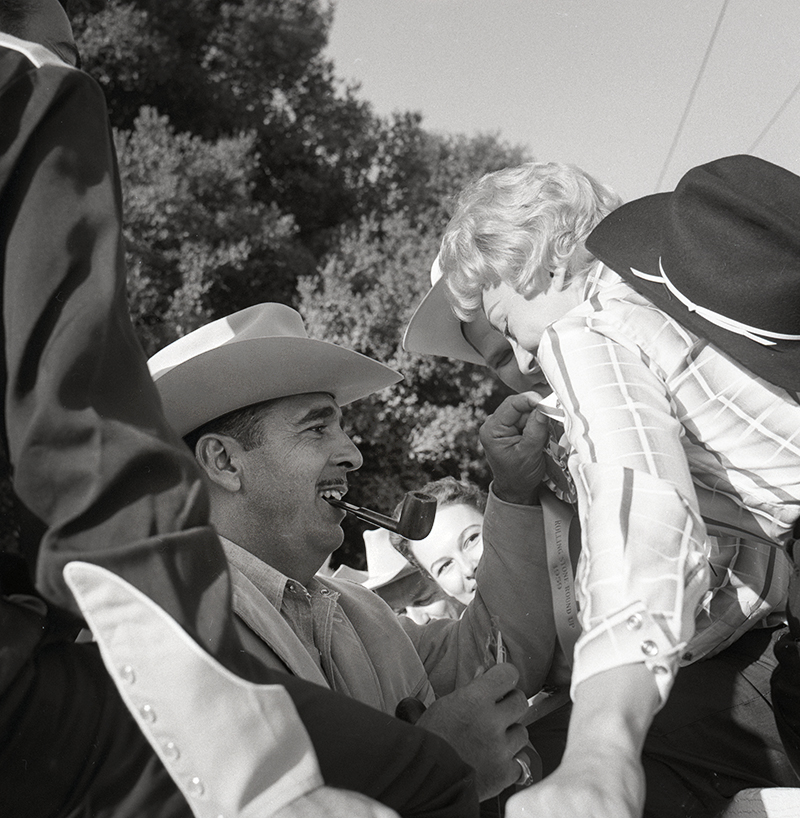
Tennesee Ernie Ford at Cliffie's Sand Canyon ranch. Click for more.
|
They confirmed their contract with a handshake on a pickup truck on a hunting trip. Their partnership lasted for more than 10 years. In 1956, Cliffie became producer of Ford's NBC television variety series, "The Tennessee Ernie Ford Show." He retired as Ford's manager after "The Ford Show" ended in 1961. Stone is also credited with the discovery of Country stars such as Molly Bee, Hank Thompson and Stan Freberg.
Over the years, Stone and his band recorded hit Country songs such as "Silver Stars, Purple Sage, Eyes of Blue" (1947), "Peepin' Thru the Keyhole (Watching Jole Blon)" (1948), "When My Blue Moon Turns to Gold Again" (1948), and "Little Pink Mack" (recorded with Kay Adams in 1966). Perhaps his most successful song was "The Popcorn Song" which reached number 14 on Billboard's pop music charts in 1955.
In total, he recorded six albums of his own. His band went through five name changes: Cliffie Stone & His Orchestra, Cliffie Stone & His Barn Dance Band, Cliffie Stone & His Hometown Jamboree Gang, Cliffie Stone & His Hepcats, and Cliffie Stone's Country Hombres.
In the early 1950s, Stone started a music publishing company called Central Songs along with Ford and Capitol producers Lee Gillette and Ken Nelson. The company was sold to Capitol Records in 1969. He later became head of Granite Records, where he recorded Molly Bee and Tex Williams.
Honors for Cliffie Stone.
To recognize his illustrious career, Stone was honored with the prestigious Pioneer Award from the Academy of Country and Western Music in 1973 and was inducted into the Country Disc Jockey Hall of Fame by the Federation of International Country Air Personalities in Nashville in 1979.
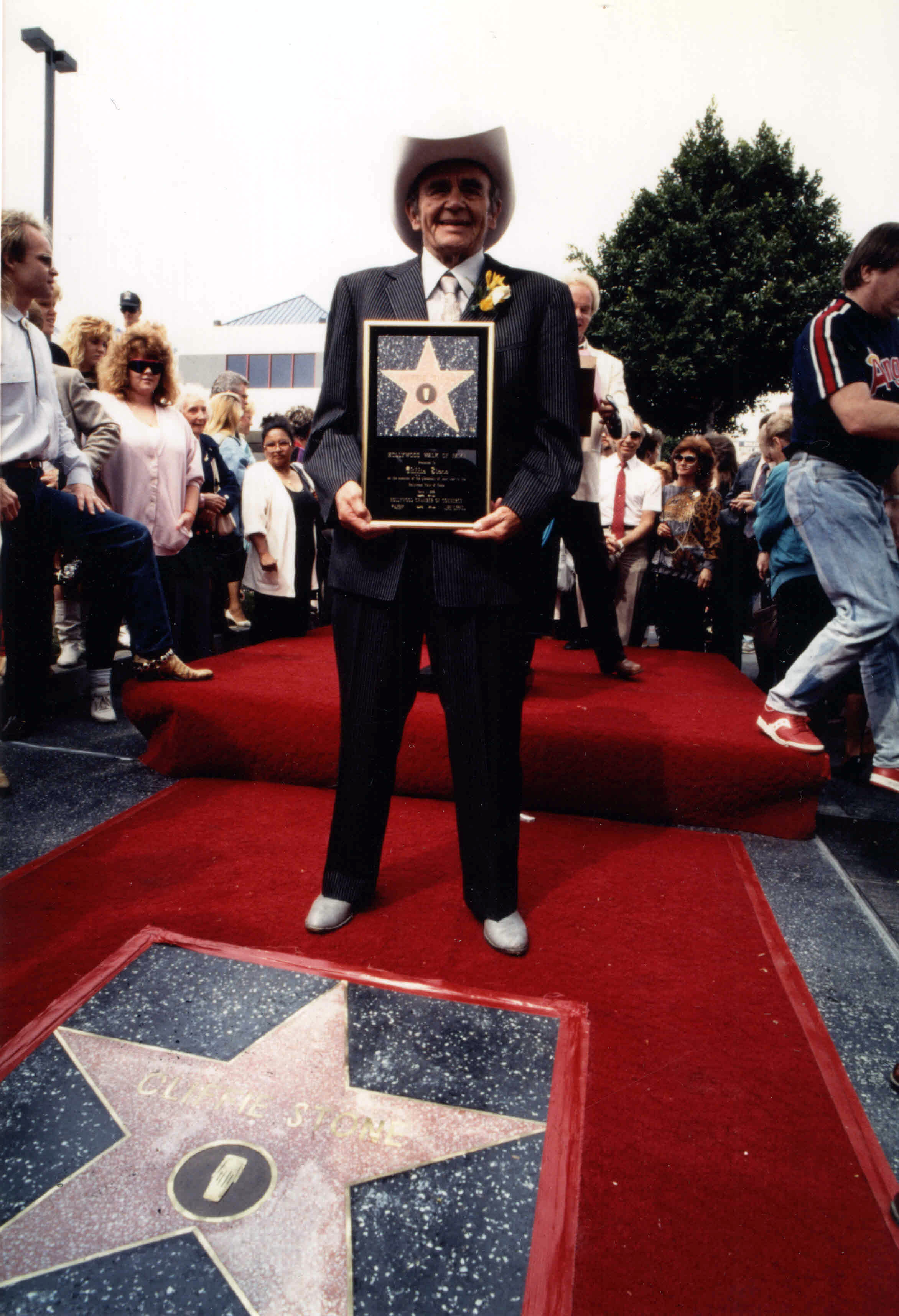
Click to enlarge.
|
Cliffie Stone was a revered personality in Santa Clarita. He was named Grand Marshal of the Frontier Days Parade in October 1980. In 1981, after a successful campaign by the local Elks Club, Stone became honorary mayor of the Little Santa Clara Valley (SCV). More than 200 guests, including many local dignitaries such as Supervisor Mike Antonovich, showed up for a celebratory evening at the Elks Lodge to honor Stone.
He received a star on the Hollywood Walk of Fame on March 1, 1989. It was the 1887th star given out by the Hollywood Chamber of Commerce and is located on the corner of Sunset Boulevard and Vine Street. Stone was honored for his contributions to the music industry as a performer, songwriter, producer and publisher. Sadly, the ceremony took place on his birthday, just eight days after his first wife Dorothy died of kidney disease. Stone felt the location of the star was appropriate for him, stating: "I worked on Vine Street for 30 years at Capitol Records and at ATV Music and along those places on Hollywood Boulevard. I used to walk down Hollywood Boulevard and look down and think, 'Wow, that's wonderful.' I was almost embarrassed when they told me."
In an interview shortly after a ceremony attended by Gene Autry, Pat Buttram and many others, Stone said: "I stood on that podium and looked out over the crowd, and I guess I saw 300 people that I have had a relationship personally with. They were all happy and smiling. It made me feel wonderful. I'm on a high, and I haven't had a drink in 10 years."
He further observed: "As I looked out over that crowd, I saw all the people in the TV shows, movies, radio shows and records that I worked with. It was a rerun of my whole life."
The Country Music Hall of Fame.
On October 9, 1989, Cliffie Stone became the newest member of the Country Music Hall of Fame. He received his award at the Country Music Association Awards show in Nashville. Present with him were his three music industry sons, Warner Brothers Music vice president Steve Stone, pop publisher Jonathan Stone, and musician Curtis Stone. That same night, Curtis received the award for Best Vocal Group of the Year for his band, Highway 101.
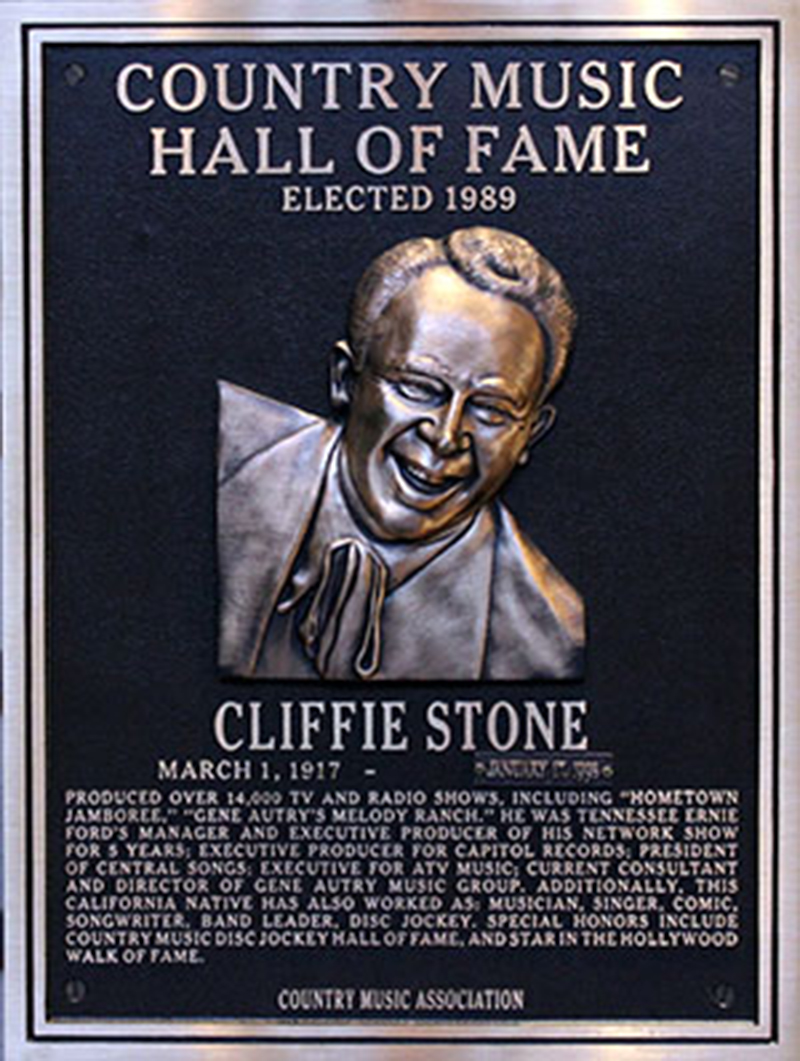
Click to enlarge.
|
Cliffie credited his father with getting him into show business: "My dad was just Cliff Snyder, and he became Herman the Hermit because John Wayne was starring in this movie called 'The Big Trail.' It was directed by Raoul Walsh, the famous one-eyed director. Dad had a dog kennel. Walsh wanted 60 'atmosphere' dogs — dogs to lay under wagons and up on porches. It was, of course, the perennial story of the prairie schooner coming across, OK? So, they went up to Jackson Hole, Wyoming, to shoot it for three months."
As it turns out, 1930's "The Big Trail" was one of the earliest "talkie" movies and John Wayne's first starring role. To get the right look for the movie, Walsh instructed his actors to grow out their hair and beards. As there was no entertainment available in Jackson Hole in those days, Snyder would play his banjo at night while Wayne and other cast and crew members played poker. Given his banjo talents, Snyder was hired to score the movie.
After watching the movie, singing cowboy Stuart Hamblen had Snyder come in for an audition. He was still sporting his hair and beard from the movie. According to Cliffie: "Stuart saw him and says, 'Oh gosh! Don't get a shave. Don't get a haircut. We'll call you Herman the Hermit and make up a story that I discovered you in the hills of Burbank living in a cave.' About a year later, my dad called me and said the bass player was very ill, and maybe if I could come down there I could play on the show, too. They didn't want anyone to know Herman the Hermit had a son, so they called me 'Cliffie Stonehead.' I weighed about 300 pounds, the big, fat comedian you see in every group. I was pretty cute." Both Cliffie and his dad became stars on the most popular Country radio show in Los Angeles.
Stone's plaque in the Country Music Hall of Fame reads: "Elected in Country Music Hall of Fame in 1989, Cliffie Stone produced over 14,000 TV and radio shows including 'Hometown Jamboree,' 'Gene Autry's Melody Ranch,' was Tennessee Ernie Ford's manager and executive producer of Ernie's network show for five years, executive producer for Capitol Records, President of Central Songs, executive producer for ATV Music, currently consultant and director of Gene Autry Music Group. Additionally, this California native also worked as a musician, singer, comedian, songwriter, band leader and disc jockey. Special honors include Country Music Disc Jockey Hall of Fame, and star in Hollywood Walk of Fame."
In Service to His Community.
Along with all of his musical activities, Stone found time to serve his local community as a board member of the Sulphur Springs Union School District, and on the Board of Trustees of Henry Mayo Newhall Memorial Hospital. He served as emcee for the ceremony that honored Gene Autry, William S. Hart and Tom Mix as the first Western stars to receive plaques on the Newhall Walk of Western Stars in 1981. For 20 years, Stone produced and performed in the free Labor Day "Country Jamboree" program at William S. Hart Park in Newhall.
Two years after moving to the Santa Clarita Valley in 1956, he authored a column for The Signal newspaper called "The Rolling Stone." For all of his accomplishments, Stone received his own bronze star on the Newhall Western Walk of Stars in 1990.

Cliffie at the Palomino Club, 1988. Click to enlarge.
|
After the death of his first wife Dorothy in 1989, Stone married singer and songwriter Joan Carol in July 1989. Cliffie and Joan co-wrote two books, "Everything You Always Wanted to Know About Songwriting..." (1991); and a talent show book titled, "You Gotta Be Bad Before You Can Be Good" (2000).
Stone died of a heart attack at age 80 in his Canyon Country home on January 16, 1998. He was survived by Joan and his four children. Said daughter Linda Stone Hyde following his death: "He just loved working with new talent. Every single person he ever met said they liked him. Every single person said he was just great."
Cliffie Stone received a posthumous honor from the Academy of Country Music in 1999 when the organization renamed its Pioneer Award as "The Cliffie Pioneer Award." Charlie Pride presented the first "Cliffie" at that year's awards show to Glen Campbell. In 2007, the award was renamed "The Cliffie Stone Pioneer Award." Of the honor, Joan Carol Stone said: "It's in living memory to him. He has been the most important influence on Country music that the West Coast has ever had, which has now become an integral part of Country music's history with worldwide effects."
Responding to Joan's statement, an editorial in The Signal concluded: "Indeed. We know Cliffie is proud, too, and likewise proud to be an integral part of the Santa Clarita Valley's Western heritage."
©2019 | Alan Pollack, M.D., is president of the Santa Clarita Valley Historical Society.
|
